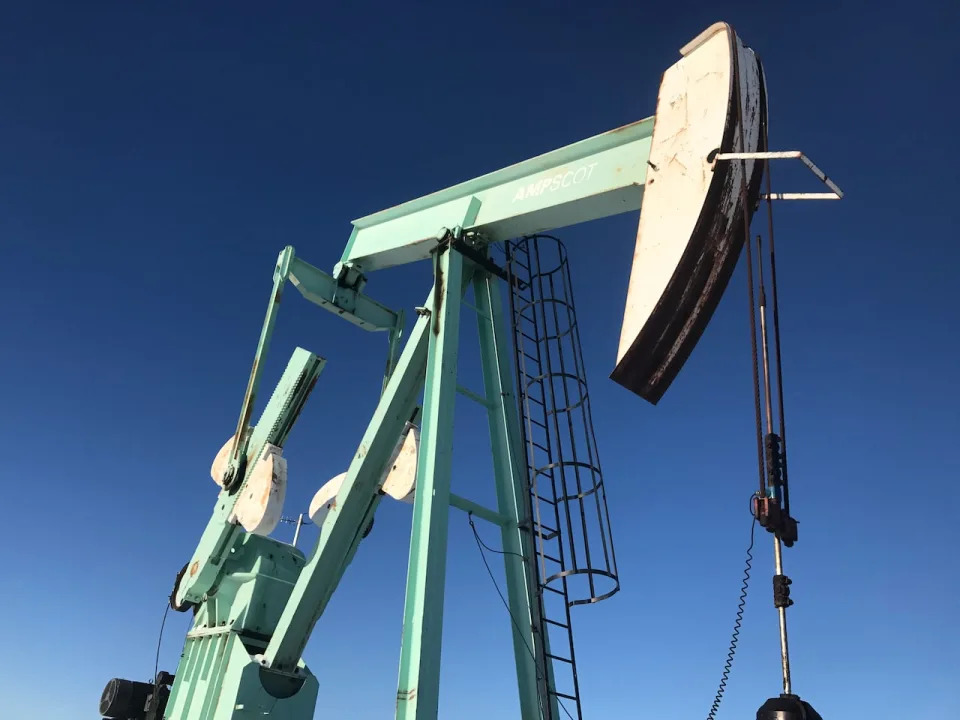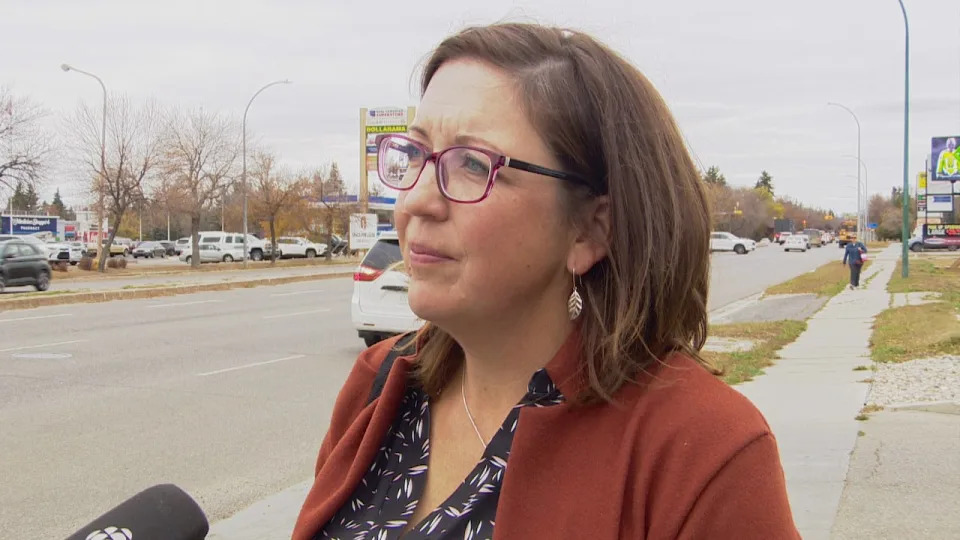CBC
Tue, November 14, 2023

Many private property owners in Saskatchewan don't own the minerals beneath the surface of their land. Resources companies, including those in the oil and gas sector, can purchase those rights — but they need the surface rights before they can come onto the property.
(Kyle Bakx/CBC - image credit)
Stephanie Fradette felt uncomfortable as she sat across from a panel in Regina last month, anticipating an uphill battle to get what she felt Crescent Point Energy Corp., a Calgary-based oil and gas company, owed her to use her land.
Fradette, a rancher from Lake Alma, Sask., a southern community of about 270 people, drove about 150 kilometres to represent herself in the hearing. Her opponent: a corporate lawyer with thick binders and several witnesses.
"To be asked to come and go toe-to-toe against oil-field, pipeline lawyers, it's really, really intimidating," Fradette told CBC News.
Fradette's case centres around a pipe Crescent Point Energy built on her land, but it illustrates broader concerns about surface rights law in Saskatchewan and the quasi-judicial body that handles disputes.
The case also shines a light on social dynamics that can pressure rural residents to make way for development.

Hansard archives show that, over the years, provincial politicians have periodically debated about surface rights legislation and the Surface Rights Board of Arbitration, the body that handles disputes.
Stephanie Fradette felt uncomfortable as she sat across from a panel in Regina last month, anticipating an uphill battle to get what she felt Crescent Point Energy Corp., a Calgary-based oil and gas company, owed her to use her land.
Fradette, a rancher from Lake Alma, Sask., a southern community of about 270 people, drove about 150 kilometres to represent herself in the hearing. Her opponent: a corporate lawyer with thick binders and several witnesses.
"To be asked to come and go toe-to-toe against oil-field, pipeline lawyers, it's really, really intimidating," Fradette told CBC News.
Fradette's case centres around a pipe Crescent Point Energy built on her land, but it illustrates broader concerns about surface rights law in Saskatchewan and the quasi-judicial body that handles disputes.
The case also shines a light on social dynamics that can pressure rural residents to make way for development.

Hansard archives show that, over the years, provincial politicians have periodically debated about surface rights legislation and the Surface Rights Board of Arbitration, the body that handles disputes.
(Nicholas Frew/CBC)
Many deeds in Saskatchewan are only surface-deep. In most cases, private landowners do not own what lies beneath their property.
Resource companies can purchase the rights to elements that lie below, but have to get surface rights before they are allowed on the land.
In Fradette's case, Crescent Point Energy wanted to build a flow line — piping used to move oil or minerals from a wellhead — on two parcels of the Fradettes' property, including near their house.
The property already has a disposal line running beneath it, Fradette said, adding that they were told the line was leaking.
The Fradettes told Crescent Point representatives the company could come on the land if it would replace the old line, she said. Crescent Point wanted to build the new line and leave the old one in the ground.
Murray Douglas, the lawyer representing Crescent Point Energy, told the board during last month's hearing that old lines aren't dug up because it would lead to further soil disturbance.
Per surface rights legislation, companies must restore the land as it was. Them not doing so is a common complaint, Douglas told the board, so as long as the land is clean and acceptable to the regulator, that's what will be done.
Crescent Point Energy eventually applied to Saskatchewan's Surface Rights Board of Arbitration — an appointed board that is supposed to be a last resort — for the right of entry.
The board granted the company access to the property on Sept. 30, 2021, in part because it did not receive an objection, says the publicly available right-of-entry order.
Fradette and her husband did oppose, she told CBC News. They were just too late.

Stephanie Fradette is waiting to hear how much she and her husband will be compensated for a flow line that was built on their property.
Many deeds in Saskatchewan are only surface-deep. In most cases, private landowners do not own what lies beneath their property.
Resource companies can purchase the rights to elements that lie below, but have to get surface rights before they are allowed on the land.
In Fradette's case, Crescent Point Energy wanted to build a flow line — piping used to move oil or minerals from a wellhead — on two parcels of the Fradettes' property, including near their house.
The property already has a disposal line running beneath it, Fradette said, adding that they were told the line was leaking.
The Fradettes told Crescent Point representatives the company could come on the land if it would replace the old line, she said. Crescent Point wanted to build the new line and leave the old one in the ground.
Murray Douglas, the lawyer representing Crescent Point Energy, told the board during last month's hearing that old lines aren't dug up because it would lead to further soil disturbance.
Per surface rights legislation, companies must restore the land as it was. Them not doing so is a common complaint, Douglas told the board, so as long as the land is clean and acceptable to the regulator, that's what will be done.
Crescent Point Energy eventually applied to Saskatchewan's Surface Rights Board of Arbitration — an appointed board that is supposed to be a last resort — for the right of entry.
The board granted the company access to the property on Sept. 30, 2021, in part because it did not receive an objection, says the publicly available right-of-entry order.
Fradette and her husband did oppose, she told CBC News. They were just too late.

Stephanie Fradette is waiting to hear how much she and her husband will be compensated for a flow line that was built on their property.
(Vashisth Trivedi/CBC)
If a company applies for right-of-entry, the property owner has seven days to object, legislation states.
By the time the Fradettes checked their mail and found a notice of the application, that period had passed, Fradette said, adding that she sent an email after receipt anyway.
Crescent Point Energy has since built a new flow line that parallels the old one, Fradette said.
Compensation hearings, such as the one Fradette attended last month, are held when the board has to determine payment for surface rights that were acquired, the legislation says.
A compensation order for Fradette's case is pending, the board's secretary told CBC News via email.
Striking a balance
Saskatchewan Energy and Resources Minister Jon Reiter, during a recent scrum at the legislature, described surface rights as a balance between being pro-business and protecting landowners.
For mining, surface rights are required to conduct geographical surveys to ensure the province's mineral reserves — potash, for example — can safely be accessed, said Pam Schwann, president of the Saskatchewan Mining Association.
Saskatchewan's Surface Rights Acquisition and Compensation Act lays out how industry can obtain surface rights and compensate landowners, and how to maintain and reclaim the land.
The provincial government passed amendments last spring that empower the arbitration board to levy greater fines for property damage — raising the maximum from $1,000 to $30,000 — and better hold companies accountable. Helium and lithium will also fall under the board's purview.
"The important thing is that landowners' rights are protected," Reiter told reporters recently. "These incidents don't happen that often, but when they do, it's important that they get what they're entitled to."

Saskatchewan Energy and Resources Minister Jon Reiter described surface rights as a balance between protecting landowners and accommodating business.
If a company applies for right-of-entry, the property owner has seven days to object, legislation states.
By the time the Fradettes checked their mail and found a notice of the application, that period had passed, Fradette said, adding that she sent an email after receipt anyway.
Crescent Point Energy has since built a new flow line that parallels the old one, Fradette said.
Compensation hearings, such as the one Fradette attended last month, are held when the board has to determine payment for surface rights that were acquired, the legislation says.
A compensation order for Fradette's case is pending, the board's secretary told CBC News via email.
Striking a balance
Saskatchewan Energy and Resources Minister Jon Reiter, during a recent scrum at the legislature, described surface rights as a balance between being pro-business and protecting landowners.
For mining, surface rights are required to conduct geographical surveys to ensure the province's mineral reserves — potash, for example — can safely be accessed, said Pam Schwann, president of the Saskatchewan Mining Association.
Saskatchewan's Surface Rights Acquisition and Compensation Act lays out how industry can obtain surface rights and compensate landowners, and how to maintain and reclaim the land.
The provincial government passed amendments last spring that empower the arbitration board to levy greater fines for property damage — raising the maximum from $1,000 to $30,000 — and better hold companies accountable. Helium and lithium will also fall under the board's purview.
"The important thing is that landowners' rights are protected," Reiter told reporters recently. "These incidents don't happen that often, but when they do, it's important that they get what they're entitled to."

Saskatchewan Energy and Resources Minister Jon Reiter described surface rights as a balance between protecting landowners and accommodating business.
(Vashisth Trivedi/CBC)
The changes, which take effect next year, are the first "significant amendments" to the law since its inception in 1968, Reiter said.
There have long been concerns, however, that the law and the board are stacked against property owners, most of whom are farmers and ranchers living in rural Saskatchewan.
"If you've bought the mineral rights, you have a legal right to access them through the surface," said Emily Eaton, a professor of geography and environmental studies at the University of Regina.
Hansard archives show Opposition politicians, over the years, have questioned whether the arbitration process was biased toward industry, including concerns that it defaulted to whatever compensation the company initially proposed to the landowner.
"People are somewhat cynical about their ability to get proper compensation and action through the board," Eaton said.
No one on the arbitration board could comment on its process and procedures, because the compensation order is pending, the board's secretary said.
In addition to compensation for the flow line project, legislation states the board could direct Crescent Point Energy to pay the Fradettes an annual rent for up to three years. The rent could amount to up to half of the compensation awarded for the flow line.
Fradette could also be reimbursed for "reasonable costs and expenses" she incurred to attend last month's hearing, the law says.
Culture of silence
In rural Saskatchewan, many property owners feel compelled to roll over for companies seeking surface rights, because not doing so could have social repercussions, Eaton said.
"To be actively opposing the industry is really taboo in a lot these rural areas, because it might be understood that you're threatening the prosperity of the community, or the jobs of your family members," Eaton said.
This has contributed to a culture of silence when it comes to surface rights, she said. A property owner must be "really committed to making a point" to go to the arbitration board.

Emily Eaton, a University of Regina professor of geography and environmental science, says people living in rural Saskatchewan feel social pressure to not make waves about surface rights.
The changes, which take effect next year, are the first "significant amendments" to the law since its inception in 1968, Reiter said.
There have long been concerns, however, that the law and the board are stacked against property owners, most of whom are farmers and ranchers living in rural Saskatchewan.
"If you've bought the mineral rights, you have a legal right to access them through the surface," said Emily Eaton, a professor of geography and environmental studies at the University of Regina.
Hansard archives show Opposition politicians, over the years, have questioned whether the arbitration process was biased toward industry, including concerns that it defaulted to whatever compensation the company initially proposed to the landowner.
"People are somewhat cynical about their ability to get proper compensation and action through the board," Eaton said.
No one on the arbitration board could comment on its process and procedures, because the compensation order is pending, the board's secretary said.
In addition to compensation for the flow line project, legislation states the board could direct Crescent Point Energy to pay the Fradettes an annual rent for up to three years. The rent could amount to up to half of the compensation awarded for the flow line.
Fradette could also be reimbursed for "reasonable costs and expenses" she incurred to attend last month's hearing, the law says.
Culture of silence
In rural Saskatchewan, many property owners feel compelled to roll over for companies seeking surface rights, because not doing so could have social repercussions, Eaton said.
"To be actively opposing the industry is really taboo in a lot these rural areas, because it might be understood that you're threatening the prosperity of the community, or the jobs of your family members," Eaton said.
This has contributed to a culture of silence when it comes to surface rights, she said. A property owner must be "really committed to making a point" to go to the arbitration board.

Emily Eaton, a University of Regina professor of geography and environmental science, says people living in rural Saskatchewan feel social pressure to not make waves about surface rights.
(Michael Bell/The Canadian Press)
No one had spoken directly to Fradette as of her interview with CBC News — but she heard the rumours, she said.
"It's just crummy to be part of the neighbourhood gossip — especially misrepresented gossip," Fradette said.
"Farmers are businessmen. They own land for a reason and, I think, most of them are open to projects. But you have to make sure it's good for you and not just good for the other guy."
Fraudette said she is skeptical she'll receive anything other than what Crescent Point Energy agreed to pay other landowners.
She familiarized herself with the surface rights law on her own time — in part so she wouldn't have to share the earnings with a lawyer.
"You're already getting a very small amount of money and you would spend most of it — or all of it — on legal advice, to come to a hearing to find out that everything they're doing is legal anyway," Fradette said.
"They're not doing anything illegal."
No one had spoken directly to Fradette as of her interview with CBC News — but she heard the rumours, she said.
"It's just crummy to be part of the neighbourhood gossip — especially misrepresented gossip," Fradette said.
"Farmers are businessmen. They own land for a reason and, I think, most of them are open to projects. But you have to make sure it's good for you and not just good for the other guy."
Fraudette said she is skeptical she'll receive anything other than what Crescent Point Energy agreed to pay other landowners.
She familiarized herself with the surface rights law on her own time — in part so she wouldn't have to share the earnings with a lawyer.
"You're already getting a very small amount of money and you would spend most of it — or all of it — on legal advice, to come to a hearing to find out that everything they're doing is legal anyway," Fradette said.
"They're not doing anything illegal."
No comments:
Post a Comment